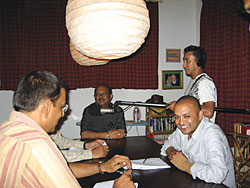 ASHA MAGARATI |
In order to save his vehicle, which he bought with a bank loan, the driver tries to flee the attackers but in the process mows down a group of students, killing one and injuring two others. The streets erupt in protest, and the students want Rs1 million compensation, the police and the government are mute spectators.
Sound familiar? During a week when students have been setting government vehicles on fire outside campuses in Kathmandu and a young man was arrested for a hit-and-run in which six people were killed outside Bir Hospital, the above story could very well be an actual event.
And in a way it is. Fiction so resembles the raw reality of everyday life in Nepal's lawless nationscape today that one doesn't have to make anything up.
The story of Tek Bahadur Karki, the driver, in the new radio drama Tempo Tragedy is so close to this country's everyday reality that it is like listening to the evening news bulletin. Only this time it is told from the perspective of the people involved. Which is actually what news should be: it should tell us the stories of ordinary people caught up in extraordinary circumstances, but media resorts to a purposely depersonalised event-driven format.
In each episode we live through the tragedy of Tek Bahdur Karki's life. The 30-year-old comes from Sindhupalchok, can't afford college fees and becomes a tempo driver. He takes care of his brother and sister, who are studying. His mother, a health volunteer, lives in the village. The only thing that is perhaps different from reality is that Tek Bahadur says he can't, and won't, pay the money. He decides to take the matter to court, and let the rule of law decide his fate, not the rule of mob.
The subscript in the plot of Tempo Tragedy is the prevalent lawlessness in the country, the culture of impunity and of citizens who only demand rights but know nothing of responsibility. There is a strong message that a banda may push for a group's rights, but it often infringes on the rights of others.
As with the rest of the award-winning Katha Mitho Sarangiko radio drama series, professional actors like Suresh Chand (who plays Tek's part), Asha Magarati, Dayahang Rai and Rajan Khatiwada have done a superb job. And there are five personalities who play themselves: CA member Gagan Thapa, (pictured, above) lawyer Rajendra Salav, consumer rights activist Jyoti Baniya, former CDOs Tulashi Prasad Bhattarai and Khaga Nepal. The series is directed by Deepak Rauniyar and produced by the BBC World Service Trust.
The earlier series of Katha Mitho Sarangiko won the BBC Global Reith Award in 2009. Tempo Tragedy irons out the kinks in the previous series, has world class production values and it's message will pierce the heart of every Nepali.
Kunda Dixit
Tempo Tragedy, Katha Mitho Sarangiko
broadcast on BBC Nepali Service 103 FM in Kathmandu and 110 partner stations around the country on Fridays and Saturdays at 8:15PM.
For further details:
01-5549590


